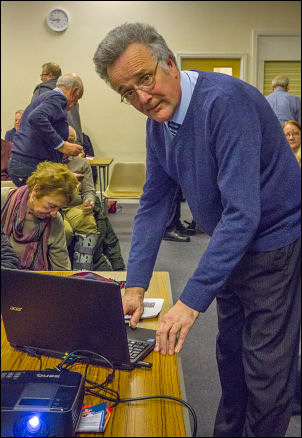|
Tue 14 Feb 2017
Dr David Hunt Ė
Death and Exile: Preston 1715. |
|
|
|
Although
well known locally as a well-respected historian it was,
surprisingly, Dr Huntís first visit to the society as a speaker.
In his capacity as the curator of the South Ribble Museum for 35
years, Dr Hunt brought a wealth of local knowledge, and a full
house, to his talk.
His talk focused on events that led
up to the Jacobite Rising of 1715, the events in Preston and its
aftermath.
A long
running conflict ran between the new monarchy, which was
Hanoverian and protestant and the old regime, Stuarts and
catholic. It came to head following Queen Anneís death in 1714.
Without an heir, parliament sought a protestant monarch and
decided upon a German. He was 56th in line to the British throne
but was crowned George I.
Dr Hunt talked about followers
of the Stuarts, the Jacobites, forming an army to march south
from Scotland. Its aim was to gather support on the way south,
large enough to confront and beat the forces of the new monarch.
|

Dr David Hunt |
 |
|
|
By the
time the Jacobites reached Preston in November 1715 its troops
numbered about 4,000. Preston, then a small town, had a
population of around 5,000. Using illustrations and images of
contemporary maps, Dr Hunt gave a detailed description of early
18th century Preston. Aerial photographs gave a modern
perspective of where the conflict took place.
Government
troops based in Wigan moved north to confront the Jacobites.
Although they crossed the Ribble at Walton-le-Dale unopposed,
the Jacobites had, however, set up defensive barricades in
Prestonís centre.
Attempts were made to breach these,
first on Church Street, then around the north side of town to
Friargate. Government troops suffered more casualties than
Jacobites and failed to enter the town. However, it became clear
to the Jacobite leaders that their attempt to lead a rebellion
against George I had failed. Although some Scots wanted to fight
on a surrender took place.
About 1,200 surrendered, 50%
Scots, 50% English and retribution was swift. There were 42
executions and 4 British officers were shot as traitors. There
were 100 locals arrested, of which some were executed and others
transported to the colonies in North America.
Dr Huntís
compelling talk was a tale of national significance with a very
local flavour.
Peter Robinson |
|
|